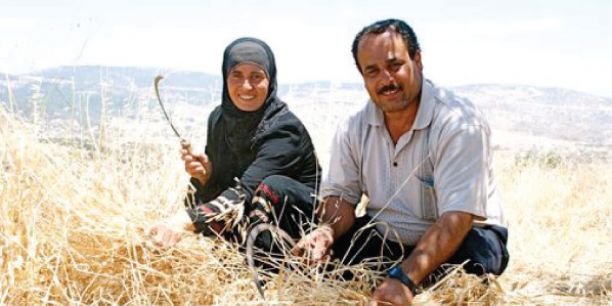
 Trace Your Delicacy
Trace Your Delicacy

 Find Canaan Locally
Find Canaan Locally
Karam Family Farm




Karam Family Farm
Canaan Fair Trade Olive Oil Producers from Jalqamous
Download printable profile (PDF)
AS STEADFAST AS THE MOUNTAIN
Aida and Mahmoud are a dynamic sister-brother producer team. Born and raised in the village of Jalqamous, they inherited their land from their parents and have been carrying on the Palestinian traditions of planting and harvesting while at the same time adopting new methods of organic agriculture to improve their soil and their environment.
Aida, who lives next door to Mahmoud and his family, has a close relationship with her sister-in-law and her two nieces, Hanin and Suha. Hanin, who is 16 years old, is a natural artist who paints and sketches moving pictures of Palestinian rural life. Her pieces are well known in Jalqamous but her most popular drawing is one depicting the Palestinian woman as the mountain that, despite so much suffering, is a source of life and strength. When meeting her aunt, Aida, one understands where she would get such an idea. In her own way, Aida has supported her family and herself while maintaining a zest for life that Hanin says, “inspires me to be an independent woman.”
SUPPORTING THE EXTENDED FAMILY
Aida and Mahmoud are the main caretakers of their extended family as well. With their great grand aunt living with Aida in the same house, the Karams take care of a total of 8 people including themselves with only one resource, the land. Since they do not have a large amount of land – their main crops are grapes and olives – they live all year round on what they make from the two harvest seasons in August and November. While they are an economically disadvantaged family, the Karam’s home is always full of delicious delicacies from their Taboun oven. The Taboun, which is a traditional Palestinian oven, is built from mud outside the house and is heated by stones and Jfit or husk (the olive remains after the press). When people come to visit, Aida likes to prepare a special Taboun lemon cake and serve it with hot black tea and sage, making her offering seem like the perfect marriage between Western food and Palestinian traditions.
While Aida and Mahmoud plant tomatoes, berries, sunflowers, and eggplants around the house, their olive grove is a long way away from their home. Every morning and afternoon they walk forty minutes each way to reach their land and tend to their olive trees. When asked why they would do all this hard work instead of pursuing jobs in the city they both say, “We love the independence we get from working in olive production. Since Canaan Fair Trade started buying our olive oil, we feel that we have a new kind of freedom in our lives. We don’t have big homes and fancy cars but we own our own lives, we get to keep our family land, we learn about what other people in the world eat, and we get to share with them the same olive oil we eat in our homes.”
YOUNG DREAMS
The Karam’s hope that their children will continue their agricultural tradition but fear that modern day demands will force them to seek work in different areas. However, Hanin is glad Canaan Fair Trade exists because she knows that next year she can apply for the Canaan Fair Trade Scholarship Program so that she can pursue her dream of going to art school in Nablus. She is confident that whatever she will end up doing in the future will involve her village, its landscape, and its people.



